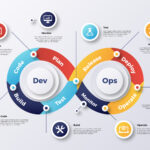In today’s fast-paced software development world, ensuring application quality through efficient testing is paramount. Automation testing tools have become indispensable for streamlining this process, saving time, and improving accuracy. But with a plethora of tools and frameworks available, choosing the right one can be overwhelming.
This blog post explores the top 10 best automation testing tools and frameworks in 2024, catering to various needs and preferences. We’ll delve into their key features, advantages, and use cases to empower you to make an informed decision.
Established and Reliable: Top 10 Best Automation Testing Tools in 2024
- Selenium: https://www.selenium.dev/ (Open-source)
Selenium remains a dominant force, supporting multiple programming languages (Java, Python, C#, etc.) and enabling cross-browser testing. It provides a robust foundation for building test automation scripts.
- Cypress: https://www.cypress.io/ (Open-source)
This JavaScript-based framework shines in end-to-end testing of web applications. Cypress offers a streamlined workflow and seamless integration with popular testing tools like Mocha and Chai.
- Appium: http://appium.io/ (Open-source)
Appium caters specifically to mobile app automation testing across various platforms (iOS, Android). It leverages the power of Selenium WebDriver for mobile testing, making it a popular choice for mobile app developers.
- TestCafe: https://testcafe.io/ (Free and commercial plans)
Built with Node.js, TestCafe is renowned for its user-friendly interface and built-in visual testing capabilities. It offers a free plan for open-source projects and paid plans for additional features.
- Katalon Studio: https://katalon.com/ (Free and commercial plans)
Katalon Studio provides a comprehensive platform that supports web, mobile, and API testing. It allows using various scripting languages (Groovy, Python, etc.) and offers a visual editor for building test cases.
- Robot Framework: https://robotframework.org/ (Open-source)
This keyword-driven framework stands out for its readability and ease of use, making it ideal for non-programmers or those new to automation testing. Robot Framework utilizes keywords written in plain English to define test cases.
- TestComplete: https://smartbear.com/product/testcomplete/ (Commercial)
TestComplete is a proprietary testing framework offering a comprehensive solution for web, mobile, desktop, and API automation testing. It provides a robust visual editor, keyword-driven testing capabilities, and integrations with various testing tools.
- Playwright: https://playwright.dev/ (Open-source)
Developed by Microsoft, Playwright is a relatively new open-source framework gaining significant traction. It supports multiple browsers (Chromium, WebKit, Firefox) and offers record/playback functionality for generating test scripts.
- WebDriverIO: https://webdriver.io/ (Open-source)
This JavaScript-based framework is gaining popularity for web application testing. WebDriverIO boasts excellent integration with various testing tools and supports headless browser testing, making it ideal for continuous integration (CI) pipelines.
- NightwatchJS: https://nightwatchjs.org/ (Open-source)
This open-source framework built with Node.js excels in automating web browser interactions. It offers flexibility and boasts a supportive community.
Choosing the Best Automation Testing Tool in 2024: Consider These Factors
- Programming Language Expertise: Select a framework that aligns with your team’s programming language proficiency (e.g., JavaScript for Cypress, Python for Selenium).
- Application Under Test: Consider the type of application you’re testing (web, mobile, API). Frameworks like Appium specialize in mobile app testing, while others cater to web applications.
- Team Familiarity: Evaluate your team’s existing knowledge of specific frameworks. Opting for a framework with some familiarity can reduce the learning curve.
- Desired Functionalities: Identify functionalities crucial for your testing needs, such as record/playback capabilities, visual testing, or parallel testing.
The Future of Automation Testing
The landscape of automation testing is constantly evolving. Here are some key trends to watch for:
- Artificial Intelligence (AI) and Machine Learning (ML) Integration: Expect frameworks to incorporate AI and ML capabilities for self-healing tests, intelligent test case generation, and anomaly detection.
- Cloud-Based Testing: Cloud-based testing solutions are gaining traction, offering scalability, flexibility, and easier collaboration. Frameworks will likely integrate seamlessly with cloud platforms.
- Focus on Low-Code/No-Code Solutions: Frameworks with low-code/no-code functionalities will empower testers with less programming expertise to participate in automation efforts.
- Enhanced Security Testing: As security concerns continue to rise, frameworks will likely offer more robust security testing features to identify vulnerabilities early in the development process.
By staying informed about these trends and selecting the most suitable automation testing tool and framework for your project, you can ensure efficient and effective software testing practices.
Embrace Automation Testing for Enhanced Efficiency
By leveraging the power of automation testing, you can significantly enhance your software development lifecycle. Carefully assess your specific needs and explore the automation testing tools and frameworks mentioned above to identify the best fit for your project. Remember, staying updated on emerging trends in the automation testing landscape is vital for continuous improvement.
Have you explored any of the 10 best automation testing tools and frameworks in 2024 mentioned in this blog? Share your experiences and insights in the comments section below! We’d love to hear from you.
Comparison Table of 10 Best Automation Testing Tools and Frameworks in 2024
| Features | Selenium | Cypress | Appium | Test Complete | Katalon Studio | Robot Framework | Playwright | WebDriverIO | TestCafe | NightwatchJS |
| Language Support | Multiple (Java, Python, C#, etc.) | JavaScript | Multiple (Java, Python, etc.) | Proprietary | Multiple (Groovy, Python, etc.) | Multiple | Multiple (JavaScript, Python, etc.) | JavaScript | Node.js | JavaScript |
| Primary Use Case | Web application testing | Web application testing | Mobile app testing | Web, mobile, desktop, API testing | Web, mobile, API testing | Web application testing | Web application testing | Web application testing | Web application testing | Web application testing |
| Record/Playback | No | Yes | Yes | Yes | Yes | No | Yes | No | No | Yes |
| Visual Testing | No (integrations available) | Yes | No | Yes | Yes | No | No | No (integrations available) | Yes | Yes |
| Cost | Open-source | Open-source | Open-source | Commercial | Free and commercial plans | Open-source | Open-source | Open-source | Free and commercial plans | Open-source |
FAQs on Test Automation Tools and Frameworks
Here are some frequently asked questions about the 10 best automation testing tools and frameworks in 2024 we explored:
- What is the difference between a test automation tool and a framework?
Test automation tools are specific software programs designed to automate testing tasks.
Frameworks, on the other hand, provide a foundation and structure for building these automated tests. They often offer functionalities like libraries, reusable code components, and reporting tools. Frameworks can leverage various test automation tools for specific actions.
- Why should I use a test automation tool or framework?
There are several benefits to using these tools:
- Increased Efficiency: Automation saves time and effort compared to manual testing, allowing you to test more thoroughly and frequently.
- Improved Accuracy: Automated tests are less prone to human error, leading to more reliable results.
- Faster Feedback: Automation enables quicker feedback on bugs and defects, accelerating the development lifecycle.
- Reduced Costs: While there might be an initial investment, automation can save costs in the long run by reducing manual testing time and effort.
- How do I choose the right test automation tool or framework?
The best choice depends on your specific needs. Consider factors like:
- Your team’s programming language expertise.
- The type of application you’re testing (web, mobile, API).
- Desired functionalities (record/playback, visual testing, etc.)
- Budget (open-source vs. commercial options)
- Is Selenium difficult to learn?
Selenium itself has a learning curve, especially for those new to coding. However, its widespread adoption means there are many resources and tutorials available to help you get started.
- What are the advantages of Cypress over other frameworks?
Cypress offers a streamlined testing experience with features like built-in waiting mechanisms and time travel debugging, making it ideal for web application testing.
- Is Appium a good choice for beginners in mobile app testing?
Appium can be a good choice, but it requires knowledge of mobile testing concepts and potentially multiple programming languages. Consider frameworks with more beginner-friendly interfaces if you’re new to mobile app testing.
- What are the limitations of TestCafe’s free plan?
The free plan is suitable for open-source projects but may lack features needed for larger-scale testing in commercial environments.
- Is Katalon Studio a good all-in-one solution?
Katalon Studio offers a comprehensive platform for web, mobile, and API testing, making it a good choice for teams that need to handle diverse testing needs.
- Is Robot Framework a good fit for non-programmers?
Robot Framework’s keyword-driven approach uses plain English keywords for defining test cases, making it easier for non-programmers or those new to automation to understand and contribute.
- What are the benefits of using a commercial tool like TestComplete?
Commercial tools like TestComplete often provide additional features like robust reporting, integrations with other testing tools, and comprehensive support, which can be valuable for large-scale or complex testing projects.
- How does Playwright compare to established frameworks like Selenium?
Playwright is a relatively new framework gaining traction due to its support for multiple browsers, record/playback functionality, and potential for faster test execution.
- Is WebDriverIO a good choice for continuous integration (CI) pipelines?
WebDriverIO’s headless browser testing capabilities make it well-suited for automated testing within CI pipelines.
- What are the strengths of NightwatchJS?
NightwatchJS offers flexibility and a supportive community, making it a good option for those looking for an open-source framework for web application testing.
- Are automation testing frameworks difficult to learn?
The learning curve for automation testing frameworks can vary. Frameworks like Robot Framework with its keyword-driven approach are considered easier to learn, while frameworks requiring coding knowledge might have a steeper learning curve.
- What are the benefits of using automation testing frameworks?
Automation testing frameworks offer numerous advantages, including:
- Increased testing efficiency and speed
- Improved test accuracy and repeatability
- Reduced manual effort and human error
- Early detection of bugs and defects
- Faster software release cycles
- Can I use multiple automation testing frameworks in a project?
Yes, you can leverage multiple frameworks within a project if needed. This approach allows you to exploit the strengths of each framework for different testing scenarios.







